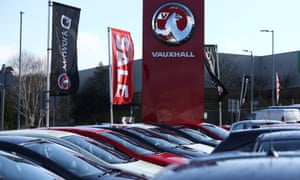UK car sales drop by a fifth after tax changes and price rises
May 05, 2017
Demand for electric and hybrid vehicles falls for first time in almost four years in April as market slows after record March

Vauxhall cars for sale at a dealership in Luton. Photograph: Phil Noble/Reuters
Car sales tumbled in April at the sharpest rate since 2010 as government cuts to subsidies for green cars and a rise in prices hit the market for new vehicles.
New car registrations fell month on month by almost 20% to 152,076 units as demand for electric and hybrid vehicles fell for the first time in almost four years.
Analysts said the 19.8% fall was a huge blow to the industry which has boomed since 2014 and underpinned the UK’s recovery.
Howard Archer, the chief economist at IHS Global Insight, warned that the incentive to bring forward purchases to March could mean that month proved to be the industry’s “last hurrah”.
Samuel Tombs, the chief UK economist at Pantheon Macroeconomics, said an average 2.9% annual rise in prices, ahead of the average 2.3% inflation rate, could put the industry on a downward trend for the rest of the year.
He added that consumers were finding it tougher to secure unsecured credit from lenders, “and the fall in consumer confidence and squeeze on real wages is making households reluctant to commit to big ticket purchases”.
Diesel cars were the biggest fallers, prompted by the continued threat of higher duties and potential bans from city centres.
Tombs said company fleet car buyers, who have propped up the market since the Brexit vote last year, continued to provide all the momentum while private car buying slumped.
“Private car registrations plunged in April because vehicle excise duty rose sharply for cars purchased after April 1,” he said.
Most buyers would have been about £400 better off over the three years by buying a low-emission car before the tax hike, although the exact savings vary according to the vehicle’s emissions and price.
It meant that registrations rose 8.4% year-over-year in March to mark the busiest month of the year for car purchases, indicating that the tax change substantially influenced behaviour.
Under the new system lower-emission models, including hybrids and plug-in hybrids, will pay between £10 and £100 in first-year excise duty after previously being exempt. All low-emission vehicles other than those with zero emissions will face a flat £140 annual charge in subsequent years.
Car sales have supported the UK’s economic recovery since 2014 when fuel prices, which surged after the financial crash, dropped by more than half. Double-digit growth in subsequent years, further helped by cheap finance deals, has proved to be a significant element of GDP growth.
Carmakers have warned the Brexit vote could force some of them to move production facilities out of the country should the UK fail to secure a favourable trade deal. Analysts have also said the fall in the pound, which makes imports more expensive, was likely to lead to higher prices and depress demand.
The Society for Motor Manufacturers and Traders, which collects the data, said the industry remained upbeat since the average for the first four months of 2017 still showed a 1.1% gain on last year to a record sales figure of 972,092.
Sue Robinson, director of the National Franchised Dealers Association, said the slump was not a surprise. “April is always one of the weakest months for new retail but with record low interest rates and record high employment levels consumer demand remains high,” she said.
Mike Hawes, SMMT chief executive, said: “It’s important to note that the market remains at record levels as customers still see many benefits in purchasing a new car. We therefore expect demand to stabilise over the year as the turbulence created by these tax changes decreases.”
Archer said while cars remained an essential purchase for many consumers, the industry should expect them to trade down to cheaper models or delay purchases once their buying power is diluted by rising inflation and muted earnings growth.
“Inflation has risen to reach 2.3% in March and is set to go higher still, while earnings growth was limited to 2.3% in the three months to February. Regular annual average earnings growth was even softer at 2.2% in the three months to February,” he said.
“The serious concern for the car sector is that it looks highly probable the fundamentals for consumers will weaken markedly further over the coming months, as rising inflation eats further into purchasing power with the squeeze reinforced by muted earnings growth. It is also very possible that consumers will face a weakening labour market.”
Source: theguardian